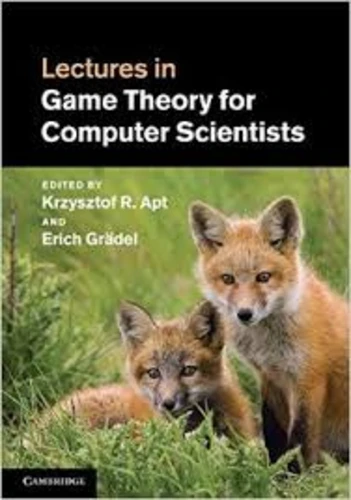Lectures in game theory for computer scientists
Par : ,Formats :
- Paiement en ligne :
- Livraison à domicile ou en point Mondial Relay indisponible
- Retrait Click and Collect en magasin gratuit
- Nombre de pages295
- PrésentationRelié
- FormatGrand Format
- Poids0.705 kg
- Dimensions17,7 cm × 25,2 cm × 2,2 cm
- ISBN978-0-521-19866-0
- EAN9780521198660
- Date de parution01/01/2011
- ÉditeurCambridge University Press
Résumé
Games provide mathematical models for interaction. Numerous tasks in computer science can be formulated in game-theoretic terms. This fresh and intuitive way of thinking about complex issues reveals underlying algorithmic questions and clarifies the relationships between different domains. This collection of lectures, by specialists in the field, provides an excellent introduction to various aspects of game theory relevant for applications in computer science that concern program design, synthesis, verification, testing and design of multi-agent or distributed systems.
Originally devised fora Spring School organised by the ESF Networking Programme on Games for Design and Verification (GAMES) in 200g, these lectures have since been revised and expanded, and range from tutorials concerning fundamental notions and methods to more advanced presentations of current research topics. at Centrum Wiskunde
Originally devised fora Spring School organised by the ESF Networking Programme on Games for Design and Verification (GAMES) in 200g, these lectures have since been revised and expanded, and range from tutorials concerning fundamental notions and methods to more advanced presentations of current research topics. at Centrum Wiskunde
Games provide mathematical models for interaction. Numerous tasks in computer science can be formulated in game-theoretic terms. This fresh and intuitive way of thinking about complex issues reveals underlying algorithmic questions and clarifies the relationships between different domains. This collection of lectures, by specialists in the field, provides an excellent introduction to various aspects of game theory relevant for applications in computer science that concern program design, synthesis, verification, testing and design of multi-agent or distributed systems.
Originally devised fora Spring School organised by the ESF Networking Programme on Games for Design and Verification (GAMES) in 200g, these lectures have since been revised and expanded, and range from tutorials concerning fundamental notions and methods to more advanced presentations of current research topics. at Centrum Wiskunde
Originally devised fora Spring School organised by the ESF Networking Programme on Games for Design and Verification (GAMES) in 200g, these lectures have since been revised and expanded, and range from tutorials concerning fundamental notions and methods to more advanced presentations of current research topics. at Centrum Wiskunde



